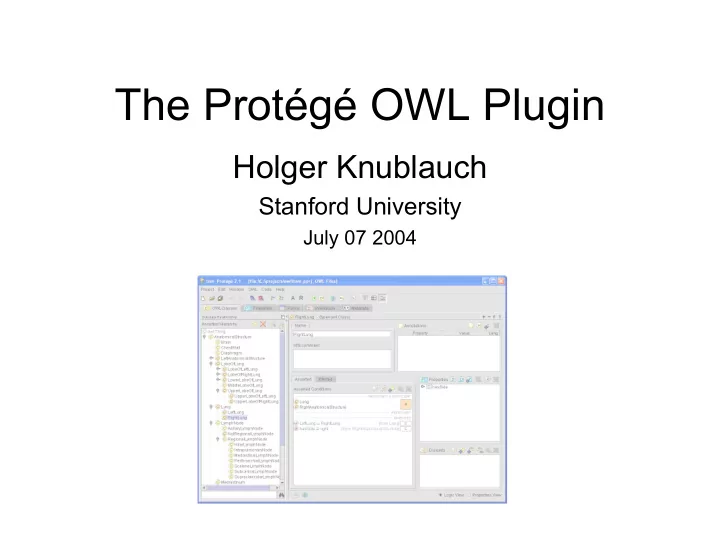

The Protégé OWL Plugin Holger Knublauch Stanford University July 07 2004
Overview The Semantic Web and OWL OWL in the Protégé Community The OWL Plugin Future Directions
The Semantic Web Shared ontologies help to exchange data and meaning between web-based services (Image by Jim Hendler)
OWL • Web Ontology Language • Official W3C Standard since Feb 2004 • A Web Language: Based on RDF(S) • An Ontology Language: Based on logic
OWL Overview OWL for data exchange Classes • Subclass relationships • Disjoint classes Properties • Characteristics (transitive, inverse) • Range and Domain Individuals • Property values Class Descriptions OWL for • Restrictions knowledge • Logical expressions sharing
Example Semantic Web OWL OWL Tourism Ontology Metadata Metadata (Individuals) (Individuals) Destination Activity Accomodation OWL OWL Metadata Metadata (Individuals) (Individuals) Web Services
Description Logics • Classes can be defined using logical expressions about their members. Restrictions Logical Expressions – allValuesFrom unionOf – someValuesFrom intersectionOf – hasValue complementOf – minCardinality Enumerations – maxCardinality – cardinality {red green blue}
Description Logics Example • Asserted definitions: – “National parks provide hiking trails” – “Hiking is a sport” – “Those destinations with sporting facilities are backpacker’s destinations” • Automatically inferred: – National parks are backpacker’s destinations
Class Descriptions: Why? • Make knowledge sharable with machines • Make explicit intentions and modeling decisions (comparable to test cases) • Make sure that individuals fulfill conditions • Tool-supported reasoning – Classification of classes and individuals – Consistency Checking
Protégé OWL Community Manchester: CO-ODE tools NCI, NLM: Stanford: Main funding OWL Plugin
OWL Plugin • Large Protégé Plugin (>560 classes) • Extends base system with – OWL language capabilities (metamodel, files) – Custom-tailored user interface – Access to description logic reasoners – Code generators etc • Many features are native to OWL • Backwards compatible where possible
OWL Plugin Architecture OWL GUI Plugins (SWRL Editors, ezOWL, OWL Extension APIs OWLViz, Wizards, etc.) (SWRL, OWL-S, etc.) OWL Plugin Protégé OWL GUI (Expression Editor, Protégé OWL API Conditions Widget, etc.) (Logical class definitions, Jena API restrictions, etc.) (Parsing, Reasoning) Protégé Core System Protégé GUI Protégé API (Tabs, Widgets, Menus) (Classes, properties, individuals, etc.) OWL File DB Storage Storage
Logic View
Prose Generation
Properties View
Classification
Consistency Checking
TODO Lists
Ontology Tests
Individuals
RDF(S) Editing • OWL extends RDF, OWL Plugin can edit RDF • Select Language Profile RDF(S)
Code Generators • Create Java classes to easier access OWL ontologies – Jena Schema generator – Kazuki interfaces • Better integration into other software development activities
Extending the OWL Plugin
Other OWL Plugins OWLViz (Manchester) ezOWL (Korea) Under Development: • OWL-S • SWRL • Semantic Debugging OWLWizards (Manchester) • Joseki (Jena Database)
Integrating Web Services • Arbitrary extensions can benefit from the Protégé infrastructure as a platform Web Service Web Resource Database
OWL Benefits • OWL is the W3C ontology standard • Interoperable with RDF and XML • Growing community and tool support • OWL has formal semantics and built-in reasoning support • Semantics support maintenance of large ontologies / knowledge models
Protégé OWL Benefits • A de facto standard tool in the OWL world • Growing number of plugins / adaptations • Custom-tailored Open-Source API • Online support • Robust platform • Compatibility with Jena • Scalable (Database backend)
OWL Risks • Steep learning curve – Difficult syntax – Difficult semantics ( → OWL Tutorial) • Semantic Web hype / Lack of real-world example applications • Chicken-and-egg problem of Semantic Web
Getting Started
OWL Tutorial (Manchester) http://www.co-ode.org/resources/
Outlook • OWL will remain a focus at Stanford – Simpler user interface – Better Workflow/Versioning support – Optimized access to reasoners (RACER) – Numeric range restrictions – Access to UML/Model Driven Architecture • More plugins will be available • Collaborations?
Recommend
More recommend